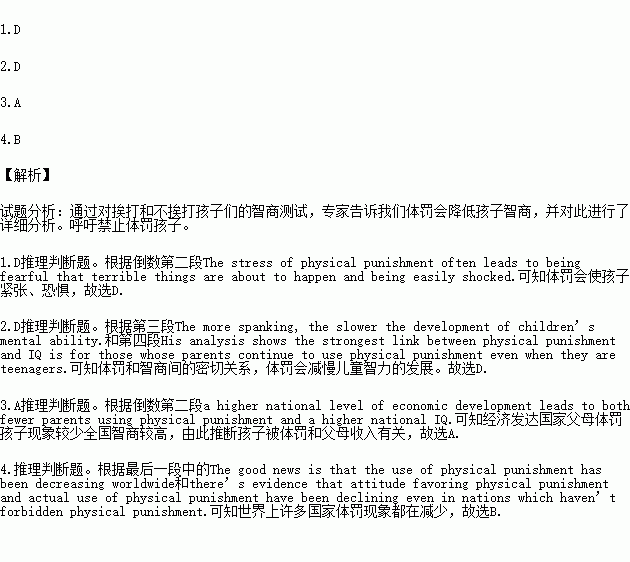题目内容
Children who are spanked (挨打) have lower IQs worldwide, including in the United States. All parents want smart children. Avoiding spanking and correcting misbehavior in other ways can help that happen.
A new research by Professor Murray Straus found that children in the United States who were spanked had lower IQs four years later than those who weren’t spanked. Straus and Mallie Paschall, a senior research scientist, studied nationally examples of 806 children aged 2 to 4, and 704 aged 5 to 9. Both groups were retested four years later.
The IQs of children IQs aged 2 to 4 who weren’t spanked were 5 points higher four year later than the IQs of those who were spanked. The IQs of children aged 5 to 9 who weren’t spanked were 2.8 points higher four years later than the IQs of children at the same age who were spanked. How often parents spanked made a difference. The more spanking, the slower the development of children’s mental ability. But even small amounts of spanking made a difference.
Straus also found a lower national average IQ in nations in which spanking was more popular. His analysis shows the strongest link between physical punishment and IQ is for those whose parents continue to use physical punishment even when they are teenagers.
Straus also found a lower national average IQ in nations in which spanking was more popular. His analysis shows the strongest link between physical punishment and IQ is for those whose parents continue to use physical punishment even when they are teenagers.
Straus and colleagues in 32 nations used data on physical punishment experienced by 17,404 university students when they were children. According to Straus, there’re two explanations for the relation of physical punishment to lower IQ.
First, physical punishment is extremely stressful and can become a long-lasting stressor for young children, who typically experience punishment three or more times a week. For many it continues for years. The stress of physical punishment often leads to being fearful that terrible things are about to happen and being easily shocked. They’re associated with lower IQ. Second, a higher national level of economic development leads to both fewer parents using physical punishment and a higher national IQ.
The good news is that the use of physical punishment has been decreasing worldwide, which may signal future gains in IQ across the globe. The United Nations has called on all member nations to forbid physical punishment by parents. Nevertheless, there’s evidence that attitude favoring physical punishment and actual use of physical punishment have been declining even in nations which haven’t forbidden physical punishment.
1. From the passage we can know that physical punishment will make______.
A. no scientist
B. a well-behaved child
C. a bad parent-child relationship
D. a child feel nervous continuously
2.It can be concluded from Paragraph 3 and Paragraph 4 that______.
A. long-term spanking will cause children’s mental disorder.
B. low national average IQ limits the mental development of children
C. young children have more chances to suffer from physical punishment.
D. high frequency of spanking results in slow development of children’s intelligence
3. According to Straus’s research, children’s being spanked is probably related to parents’______.
A. low income
B. little education
C. long-lasting pressure
D. passive personalities
4. It can be inferred from the last paragraph that______.
A. the improvement of global average IQ is out of the question
B. physical punishment becomes less popular in the world
C. most countries have realized the negative consequence of punishing in its member nations.
D. the UN has succeeded in banning physical punishment in its member nations
 名师指导期末冲刺卷系列答案
名师指导期末冲刺卷系列答案
